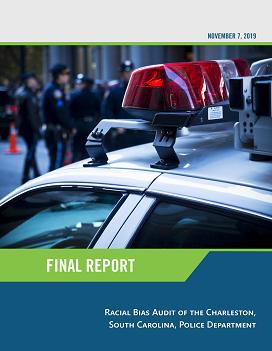Racial Bias Audit of the Charleston, South Carolina, Police Department
Authors: Denise Rodriguez, Keri Richardson, Zoë Thorkildsen, Rodney Monroe, Harold Medlock, Stephen Rickman
Many of the findings and recommendations noted in this report are not unique to the CPD and include challenges that many police agencies across the country address. Policing has reached a pivotal point, and the role of the community in ensuring public safety is becoming more apparent and vital. CPD has made significant progress over the last several years; its continued investment in recruitment, training, and technology are just a few examples. However, CPD still needs to address a number of areas to ensure greater accountability and further improve its relationship with the community. Racial disparity in traffic stops, poor data-collection practices, lack of clarity in policies on use of force and professional standards, gaps in efforts to engage various segments of the community substantively, and lack of accountability mechanisms are a few examples of the findings and recommendations noted in this report. The audit team is reassured both by CPD’s commitment to change and willingness to address these findings and implement the recommendations, and by the community’s support of the CPD. Although CPD has begun addressing a number of these findings and recommendations, continued effort and engagement with both officers and the community will be critical to ensuring the successful implementation and sustainability of these improvements.

- The Traffic Unit does not have an established strategic plan.
- Analyses of CPD's traffic stop data indicate racial disparities in stop rates and search decisions during traffic stops where a warning was issued.
- CPD's current data structure, in which use of force is understood primarily at the level of the incident, hinders analysis of trends in use of force and racial disparities at the individual level.
- Community members feel that the complaint process is illegitimate and are uncertain that their complaints will be addressed.
- CPD's community engagement activities and efforts to sustain and build relationships with community stakeholders lack a strategic and top down approach.
- Active engagement and input from the community throughout the process of implementing recommendations noted throughout this report will be key to CPD’s success in institutionalizing and sustaining change.
- Although the demographics of the department are similar to the demographics of the city of Charleston, underlying concerns remain related to the lack of diversity and inclusivity across CPD’s specialized units and teams.
- An independent, objective, and ongoing assessment of CPD's progress towards implementation of the reforms noted in this report will be essential to the success and sustainment of the reforms.
DETAILS
Copyright: CNA Corporation
Pages: 136
Document Number: IRM-2019-U-022344-Final
Year: 2019
MEDIA CONTACT
Christine LaPaille | Director of Communications
703.824.2693 | lapaillec@cna.org
John Stimpson | Communications Associate
703.824.2689 | stimpsonj@cna.org
RELATED RESEARCH
Collaborative Reform Model: A Review of Officer-Involved Shootings in the Las Vegas
Collaborative Reform Model: Six-Month Status Report of the Las Vegas Metropolitan Police Department
Collaborative Reform Model: Final Assessment Report of the Las Vegas Metropolitan Police Department
Collaborative Reform Initiative: Assessment Report on the Fayetteville Police Department
Collaborative Reform Model: An Assessment of Deadly Force in the Philadelphia Police Department
Collaborative Reform Model: Six-Month Assessment Report on the Philadelphia Police Department
Collaborative Reform Model: Six-Month Assessment Report on the Spokane Police Department


